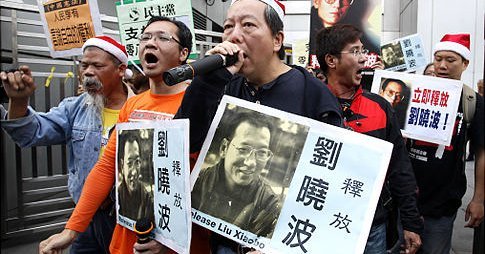On December 10th 2008 – symbolically also the 60th anniversary of the Universal Declaration of Human Rights – Charter 77 got a younger brother in China: Charter 08. Like its older sibling and example, Charter 08 does not ask to overthrow the ruling government and it does not call for bloody revolutions. It simply puts down in words a number of principles and rights whose respect Chinese citizens think can help their society and country forward; like freedom of expression, human rights and free elections. Nothing absolutely shocking or aggressive can be found in the political manifesto.
Nevertheless, on December 8th 2008, two days before the official release of Charter 08, police knocked on Liu Xiaobo’s door and took him away from his home. Liu Xiaobo is a former literature professor and a persisting human rights activist. He was also one of the founders and composers of Charter 08 and one of the first of the now almost 9000 signatories. Liu Xiaobo was bothered by Chinese security services for the first time after his involvement in the 1989 protests at the Tiananmen Square. Multiple arrests imprisonment and forced labour followed.
Since his arrest over a year ago, the now 55-year-old Liu has been in solitary confinement. It took weeks before his wife and friends found out his whereabouts. It took more than half a year before Liu Xiaobo was finally officially charged with “suspicion of inciting subversion of state power”. A charge to which police say he fully confessed.
In the meantime, his friends had not been sitting still. When Liu Xiaobo won the Homo Homini Award for important contributions to promoting human rights, democracy and non-violent resolution of political conflicts in March 2008, his friends travelled to Prague – of all places! – where NGO People in Need handed them Liu’s prize at the One World Film Festival.
Liu’s friends seized the occasion to fly to Brussels, where Human Rights Watch helped them to lobby the case of their colleague at the EU institutions. They talked about him to representatives of the Commission, the Council, the Parliament and anyone who would hear their story. The EU bodies listened and took up the cause of freeing Liu Xiaobo. The (Czech) presidency of the Union issued Council declarations and put Liu on top of the list of individual cases to be discussed at the May 2009 Human Rights Dialogue with China. Diplomats, intellectuals and authors like Salmon Rushdie, Margaret Atwood, Umberto Eco and Ha Jin followed suit and demanded Liu’s release.
The EU has a duty to react to human rights violations, including in China, and rightly did so is Liu Xiaobo’s case.
On December 23rd 2009, Liu’s trial finally started but diplomats from various States, including the Swedish EU presidency, as well as Liu’s wife and friends, were denied access to the court room. His friends were even intimidated and threatened. Yet dozens of them asked to be tried with him because “if Liu is guilty, we all are”, as one co-signatory stated. Despite this, a mere 2 days later, Liu was sentenced to 11 years of imprisonment and 2 additional years of deprivation of political rights. “A travesty of justice”, according to Human Rights Watch. Charter 08 was used as a determining piece of evidence of Liu’s desire to subvert the Chinese government. His supporters were outraged and the EU called for his “immediate and unconditional release”, but to no avail. China even retorted infuriatingly by accusing the EU of “interfering in internal affairs” and by calling its demands “unacceptable”.
Must we conclude therefore that the EU’s démarches were useless and it should better not go down the human rights road again for fear of losing face?
No.
The EU has a duty to react to human rights violations, including in China, and rightly did so is Liu Xiaobo’s case. The more the EU will cry out and risk its reputation, the more experience it will have and the more the EU insists on discussing these matters with third countries, the more its credibility will rise.
The Lisbon Treaty only gives the Union more competences and instruments for the defense of human rights. If used correctly, it can also give the EU more authority. The EU can not get discouraged by cases like Liu’s, but it should use this experience to fine-tune its actions. Because the other alternative – turning away and tabooing human rights issues with violating States – is plainly unacceptable.


1. On 25 January 2010 at 03:38, by Pietro De Matteis Replying to: The EU human rights’ voice not heard in China - Charter 08 signatory Liu Xiaobo sentenced to 11 years of jail despite EU lobbying
Replying to: The EU human rights’ voice not heard in China - Charter 08 signatory Liu Xiaobo sentenced to 11 years of jail despite EU lobbying
Thanks Sophie for this article! as a follow up you might be interested in reading this:
http://chinadigitaltimes.net/2010/01/communist-party-officials-criticize-liu-xiaobo-conviction/
再见!
Pietro
Follow the comments: |
|
